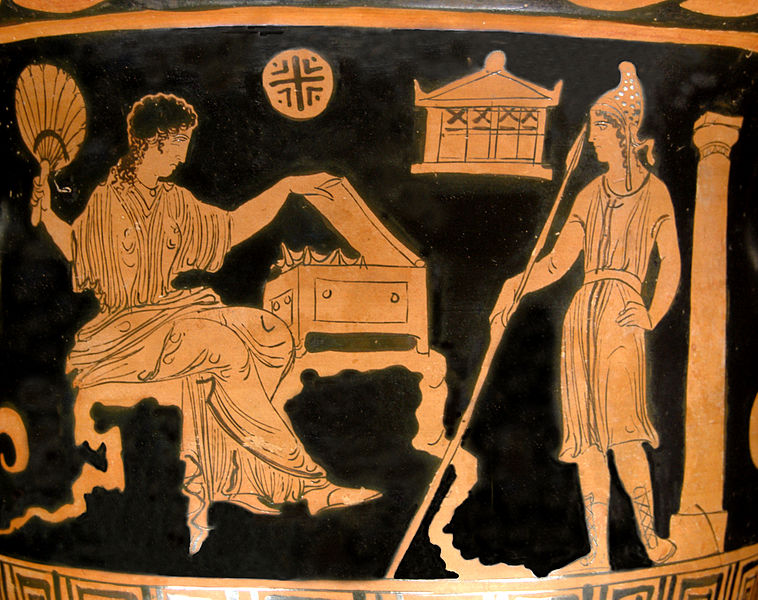Our fall play, Euripides’ The Trojan Women was written about three thousand years ago. Some might wonder why we still perform these classics that were written at the very dawn of the invention of Western Theatre- surely we could find something more recent that will capture the audiences’ imagination. Our answer is simple: Euripides’ writing stands the test of time. Sometimes an ancient piece of theatre can capture what it is to experience war just as effectively as a newspaper article or a documentary- and some might argue, even more than a traditional contemporary play.
The Trojan Women is epic on every scale imaginable. We consider it a famous and ancient story but it was famous and ancient at the writing of Euripides’ play. The story of the Trojan War has always been big and important. It deals with a mythical war, gods, and revered royalty. But Euripides’ telling comes from a very real moment in time. The play is a reaction to the events of that moment.
Euripides wrote The Trojan Women when Athens was in the midst of the Peloponnesian War with Sparta. The war decimated Athens, which was once the strongest city-state in Greece, and established Sparta as the leading power. The war was fought with new techniques adding a level of carnage never before seen. Large-scale atrocities, including ethnic cleansing, were not uncommon. In fact, thanks to Latin teacher Beatrice Cody, I recently learned that The Trojan Women was first performed just months after Athens sacked the city of Melos. Athenians brutally murdered the men of Melos and captured the women as slaves. This is the exact plot of his play- Euripides was calling out the atrocities of his countrymen on the stage where thousands could hear his protest. Needless to say, the Athenians were not pleased. Euripides finished his days in exile.

It is no accident that Euripides chose to set his play at the end of the Trojan War. While the actual Trojan War is fictional, the Ancient Greeks believed the war had happened (the origin of the myth was likely based on a number of wars in Greece during the 11th century B.C.E.). Both the Romans and Greeks incorporated it into their origin myths (the Ancient Romans traced their ancestry back to the last surviving Trojans who left the ruins of Troy for Rome).
Greek theatre is one of mythology, religion, and worship. Plays were performed at festivals for the god Dionysus. There was singing, actors wore masks, the stories involved great mythical heroes, gods and semi-gods. Realism did not exist in Ancient Greek Theatre. The original story behind Trojan Women revolves around the gods having a frivolous competition. Eris, the god of strife and discord, gave the goddesses Aphrodite, Athena, and Hera, a golden apple because they were the fairest goddesses. Not satisfied that they should share the prize, a fight erupted between the three. Zeus asked Paris, Hecuba and Priam’s son, to decide who the most beautiful goddess was. Aphrodite bribed Paris by saying that if he chose her, she would give him the most beautiful woman in the world as a prize. Paris did, and in exchange she helped Paris abduct Helen of Sparta from her husband Menelaus’ home. Poseidon, god of the sea, helped Paris and Helen cross the sea from Sparta to Troy safely where Helen became Paris’ wife. Menelaus then launched the Trojan War to win Helen back and return her to Sparta. After ten long years the Greeks got desperate to end the war. Under Odysseus’ leadership the Greeks hatched a plan to sack Troy. After pretending to set sail, late one night they placed a wooden horse, disguised as a gift for Athena, at the gates of Troy. The Trojans welcomed it into the city where they were soon besieged by an elite force of enemy fighters who were hidden inside the horse. It wasn’t long before Troy was completely defeated.

In Euripides’ story, this mythical world is combined with a very real one that describes the horrors of war with intricate detail. We hear about the slaughtering of a young boy, the rape of a young priestess, the burning of a ruined city and countless women being sold into slavery. These moments are not mythical. They are very real- they were real when Euripides first wrote about them and they are real now.
Euripides’ The Trojan Women comes to the Williston Theatre on October 15-17 and October 22-24 at 7:30 p.m. Reserve your tickets here.

